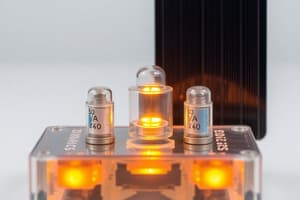Podcast
Questions and Answers
What happens when an external potential of 1.1 V is applied to a Daniell cell?
What happens when an external potential of 1.1 V is applied to a Daniell cell?
- The reaction stops, and no current flows through the cell. (correct)
- The cell begins to function as an electrolytic cell.
- The concentration of ions increases in the cell.
- The chemical reaction continues to generate electrical energy.
In which direction do electrons flow in the Daniell cell during the redox reaction?
In which direction do electrons flow in the Daniell cell during the redox reaction?
- From zinc to the external circuit.
- From zinc to copper.
- In both directions simultaneously.
- From copper to zinc. (correct)
What type of chemical reaction occurs in a galvanic cell like the Daniell cell?
What type of chemical reaction occurs in a galvanic cell like the Daniell cell?
- Non-spontaneous chemical reaction.
- Endothermic reaction only.
- Exothermic reaction only.
- Spontaneous redox reaction. (correct)
What is the primary function of an electrolytic cell compared to a Daniell cell?
What is the primary function of an electrolytic cell compared to a Daniell cell?
Which statement is true regarding the concentration of Zn2+ and Cu2+ ions in a Daniell cell?
Which statement is true regarding the concentration of Zn2+ and Cu2+ ions in a Daniell cell?
Flashcards are hidden until you start studying
Study Notes
Daniell Cell Overview
- Converts chemical energy from redox reactions into electrical energy.
- Reaction: Zn(s) + Cu²⁺(aq) → Zn²⁺(aq) + Cu(s) with a potential of 1.1 V at 1 mol dm⁻³ concentration.
Types of Electrochemical Cells
- Galvanic/Voltaic Cell: Generates electrical energy from spontaneous reactions.
- When an external voltage is applied slowly, the reaction continues until the opposing voltage reaches 1.1 V.
- At 1.1 V, the reaction stops, and no current flows.
Electrolytic Cell Function
- Increasing external potential beyond 1.1 V reverses the reaction, turning the cell into an electrolytic cell.
- This setup uses electrical energy to force non-spontaneous chemical reactions.
Important Concepts
- Activity vs Concentration: While activity is preferable to use, in dilute solutions, activity approximates concentration.
- Future studies will elaborate on the relationship between activity and concentration.
Components of Daniell Cell
- Composed of zinc and copper electrodes immersed in respective salt solutions (ZnSO₄ and CuSO₄).
- Electron Flow: Electrons flow from copper to zinc.
- Current Flow: Conventional current flows from zinc to copper.
- Zinc is deposited at the zinc electrode while copper dissolves from the copper electrode.
Studying That Suits You
Use AI to generate personalized quizzes and flashcards to suit your learning preferences.




